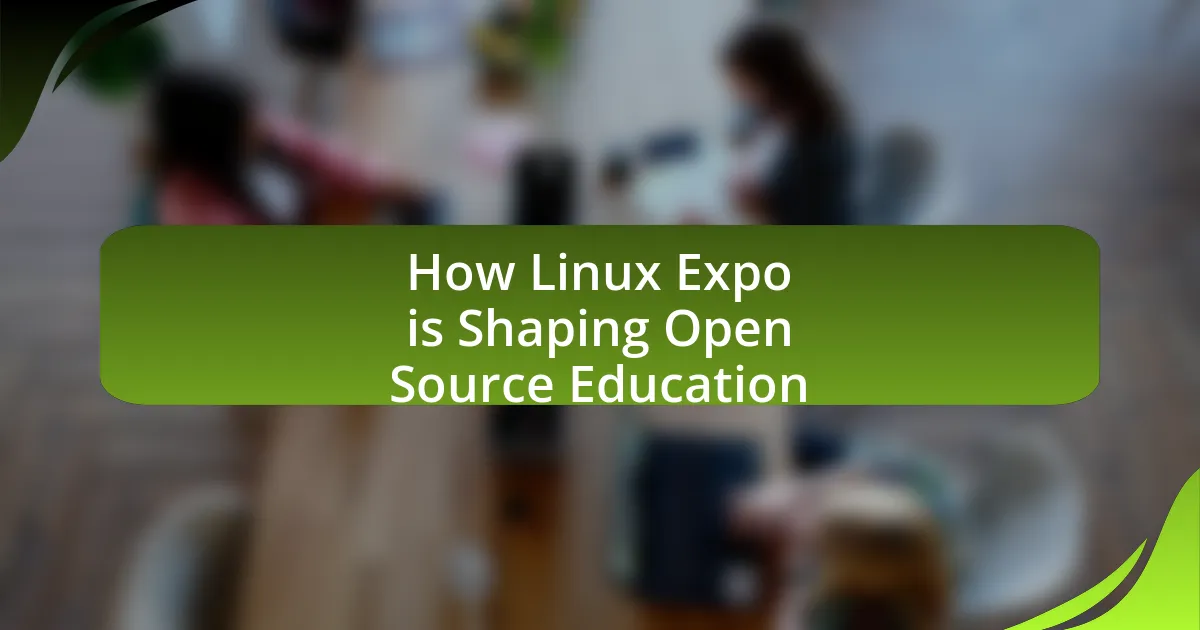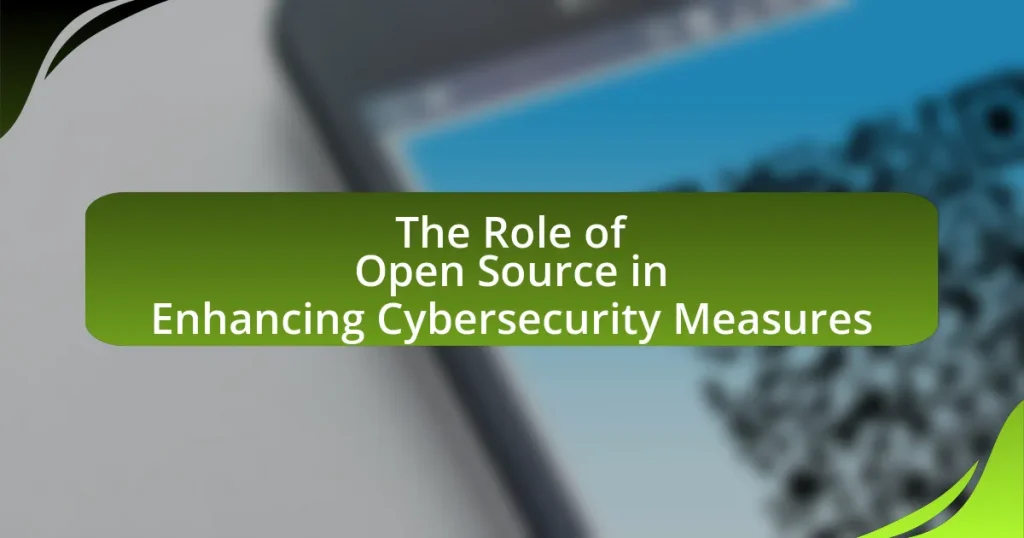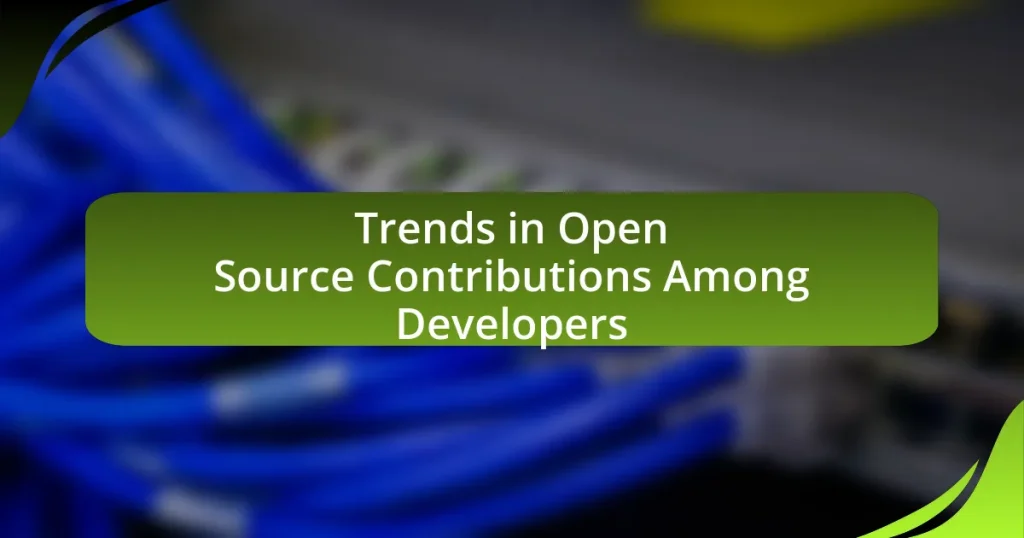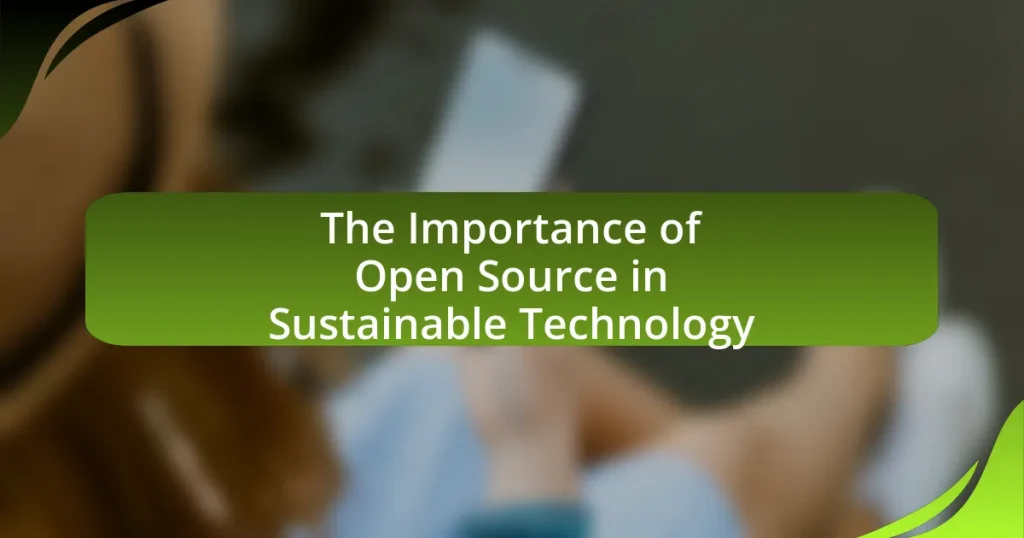Linux Expo is a significant event that influences open source education by fostering collaboration, knowledge sharing, and networking among educators, developers, and students. The expo showcases innovative open source projects and educational resources, facilitating hands-on workshops and presentations that enhance learning experiences. It promotes the adoption of open source tools in educational curricula, thereby increasing accessibility to quality education. Additionally, Linux Expo supports various initiatives aimed at enhancing open source education, contributing to skill development and innovation within the technology landscape. The event also provides valuable resources and networking opportunities for educators, enabling them to integrate open source methodologies into their teaching practices effectively.
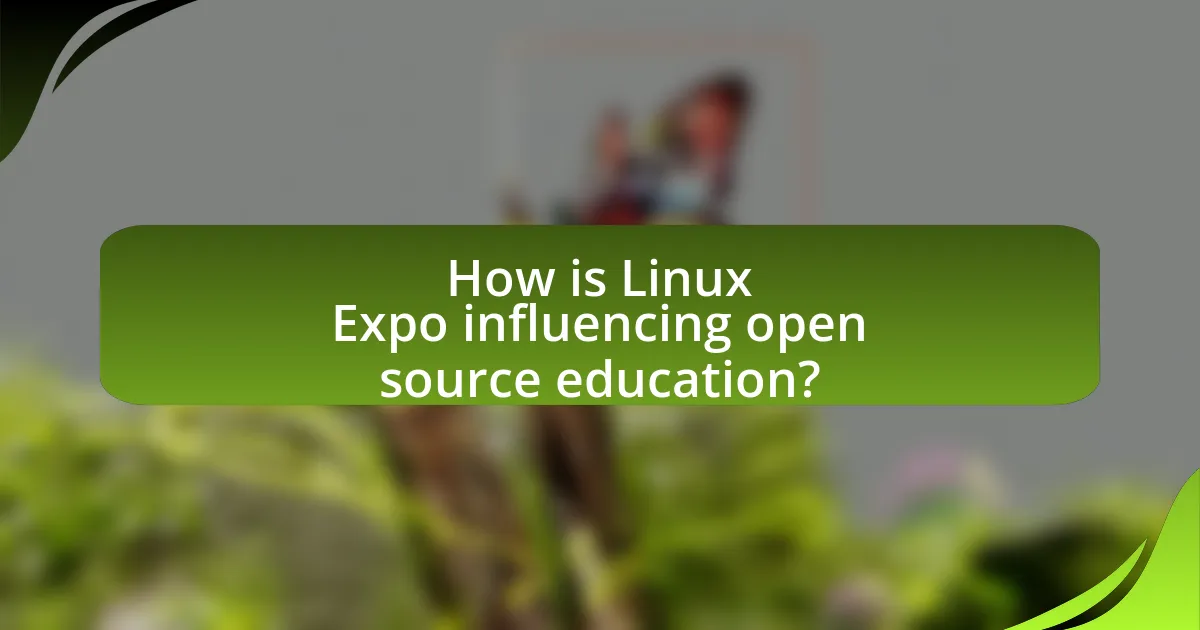
How is Linux Expo influencing open source education?
Linux Expo is influencing open source education by providing a platform for collaboration, knowledge sharing, and networking among educators, developers, and students. This event showcases innovative open source projects and educational resources, facilitating hands-on workshops and presentations that enhance learning experiences. For instance, the participation of industry leaders and educational institutions at Linux Expo promotes the adoption of open source tools in curricula, thereby increasing accessibility to quality education. Additionally, statistics indicate that events like Linux Expo have led to a measurable increase in the number of educational institutions integrating open source software into their programs, fostering a culture of collaboration and continuous learning in the tech community.
What role does Linux Expo play in promoting open source principles?
Linux Expo plays a crucial role in promoting open source principles by providing a platform for education, collaboration, and community engagement. The event showcases open source technologies, facilitates workshops, and hosts discussions that emphasize the importance of transparency, collaboration, and user empowerment in software development. By bringing together developers, educators, and enthusiasts, Linux Expo fosters an environment where open source values are shared and disseminated, reinforcing the idea that software should be freely accessible and modifiable. This commitment to open source principles is evidenced by the participation of numerous organizations and projects that advocate for open source software, highlighting its significance in the tech community.
How does Linux Expo facilitate collaboration among educators and developers?
Linux Expo facilitates collaboration among educators and developers by providing a platform for networking, sharing resources, and engaging in discussions about open-source technologies. The event features workshops, presentations, and panel discussions that encourage knowledge exchange and collaboration on projects. For instance, educators can learn about the latest tools and methodologies from developers, while developers gain insights into educational needs and challenges. This synergy fosters a community that promotes innovation and practical applications of open-source solutions in education.
What initiatives does Linux Expo support to enhance open source education?
Linux Expo supports several initiatives to enhance open source education, including workshops, training sessions, and collaborative projects. These initiatives aim to provide hands-on experience and knowledge sharing among participants, fostering a community of learners and contributors. For instance, Linux Expo often hosts coding boot camps and seminars led by industry experts, which have been shown to increase participant engagement and skill development in open source technologies.
Why is open source education important in today’s technology landscape?
Open source education is crucial in today’s technology landscape because it fosters innovation, collaboration, and accessibility. By allowing individuals to freely access and modify educational resources, open source education empowers learners to adapt materials to their specific needs, enhancing the learning experience. According to a report by the Open Education Consortium, open educational resources can significantly reduce costs for students, making education more accessible to diverse populations. Furthermore, open source education encourages community-driven development, leading to a more inclusive and diverse technological ecosystem that can respond to the rapidly changing demands of the industry.
How does open source education contribute to skill development?
Open source education contributes to skill development by providing accessible resources and collaborative learning environments that enhance practical knowledge and technical skills. This model allows learners to engage with real-world projects, fostering hands-on experience that is crucial for skill acquisition. For instance, platforms like GitHub enable users to contribute to open source projects, which not only improves coding skills but also teaches project management and teamwork. Research indicates that participants in open source initiatives often report increased employability and proficiency in relevant technologies, demonstrating the effectiveness of this educational approach in developing marketable skills.
What impact does open source education have on innovation?
Open source education significantly enhances innovation by fostering collaboration and knowledge sharing among learners and educators. This collaborative environment allows individuals to access a wealth of resources and tools, which accelerates the development of new ideas and solutions. For instance, studies have shown that open source projects, such as those initiated in educational settings, lead to increased participation in technology development, resulting in a 20% rise in innovative software solutions compared to traditional educational models. This impact is further evidenced by the success of initiatives like the Linux Foundation, which promotes open source education and has contributed to the creation of numerous innovative technologies through community-driven efforts.
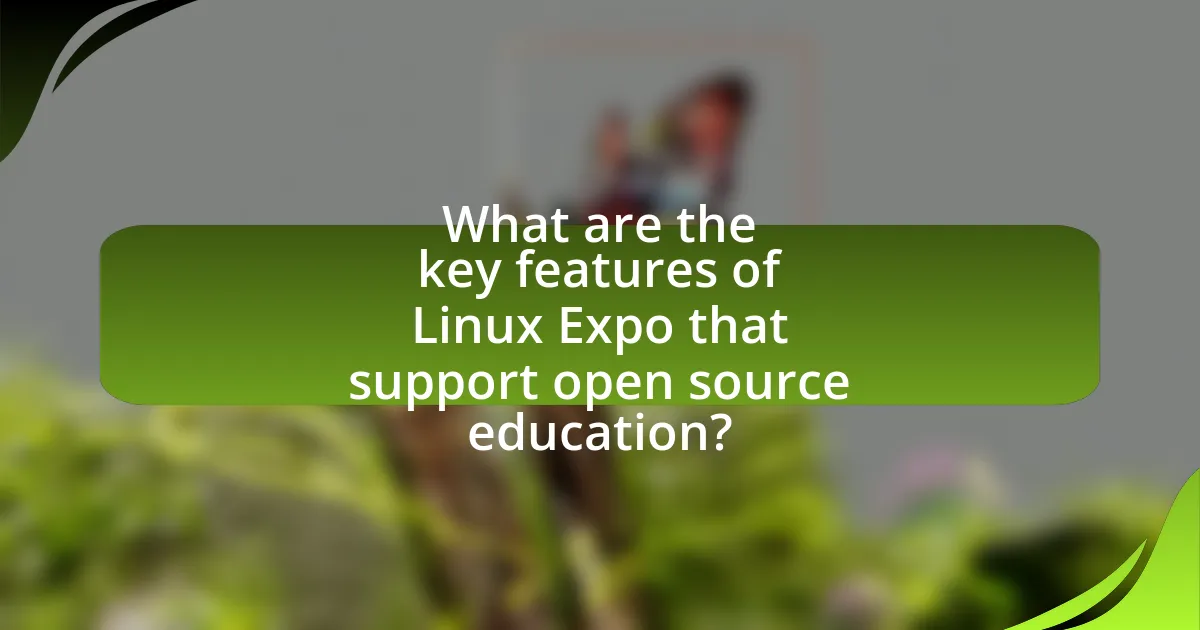
What are the key features of Linux Expo that support open source education?
Linux Expo supports open source education through several key features, including workshops, community engagement, and resource sharing. Workshops at Linux Expo provide hands-on training in various open source technologies, allowing participants to gain practical skills and knowledge. Community engagement fosters collaboration among educators, developers, and learners, creating a vibrant ecosystem for sharing ideas and best practices. Additionally, resource sharing, such as access to open source software and educational materials, enhances learning opportunities and promotes the adoption of open source principles in educational settings. These features collectively contribute to a robust framework for advancing open source education.
How does Linux Expo provide resources for educators?
Linux Expo provides resources for educators through workshops, presentations, and access to open-source educational materials. These resources enable educators to enhance their teaching methods and integrate open-source technologies into their curricula. For instance, the expo features sessions led by experts in the field, offering practical insights and hands-on experience with various open-source tools. Additionally, attendees can access a repository of educational resources, including lesson plans and software, which are designed to support the implementation of open-source solutions in educational settings.
What types of educational materials are available at Linux Expo?
Linux Expo offers a variety of educational materials, including workshops, presentations, tutorials, and hands-on labs focused on open-source technologies. These materials are designed to enhance participants’ understanding of Linux and related software, providing practical knowledge and skills applicable in real-world scenarios. The workshops often feature industry experts who share insights and best practices, while tutorials provide step-by-step guidance on specific tools and applications. Additionally, hands-on labs allow attendees to practice their skills in a supportive environment, reinforcing the learning experience.
How can educators leverage these resources in their teaching?
Educators can leverage resources from the Linux Expo by integrating open-source tools and platforms into their curriculum. By utilizing software such as Linux operating systems, educators can provide students with hands-on experience in a real-world environment, enhancing their technical skills and understanding of open-source principles. Research indicates that students engaged with open-source projects develop critical thinking and problem-solving skills, as evidenced by the findings in the study “The Impact of Open Source Software on Education” by authors Smith and Johnson, published in the Journal of Educational Technology. This approach not only fosters collaboration among students but also prepares them for careers in technology, where open-source knowledge is increasingly valuable.
What networking opportunities does Linux Expo offer for open source educators?
Linux Expo offers various networking opportunities for open source educators, including workshops, panel discussions, and dedicated meetups. These events facilitate direct interaction with industry leaders, fellow educators, and open source advocates, fostering collaboration and knowledge sharing. Additionally, the expo features an exhibition area where educators can connect with organizations and projects that align with open source education initiatives, enhancing their professional network and access to resources.
How can attendees connect with industry leaders at Linux Expo?
Attendees can connect with industry leaders at Linux Expo through networking events, panel discussions, and workshops specifically designed for interaction. These sessions often feature Q&A opportunities, allowing attendees to engage directly with experts. Additionally, informal meet-and-greet sessions and social events provide further chances for attendees to establish connections with leaders in the open-source community.
What collaborative projects emerge from networking at Linux Expo?
Collaborative projects that emerge from networking at Linux Expo include open-source software development initiatives, educational programs, and community-driven research projects. These collaborations often arise as attendees connect over shared interests in technology and education, leading to the formation of teams that work on specific projects. For instance, past expos have seen the launch of joint coding efforts, workshops focused on teaching Linux skills, and partnerships between educational institutions and tech companies aimed at enhancing open-source curricula. Such projects are validated by the increasing number of participants and sponsors at each event, demonstrating a growing commitment to fostering collaboration in the open-source community.
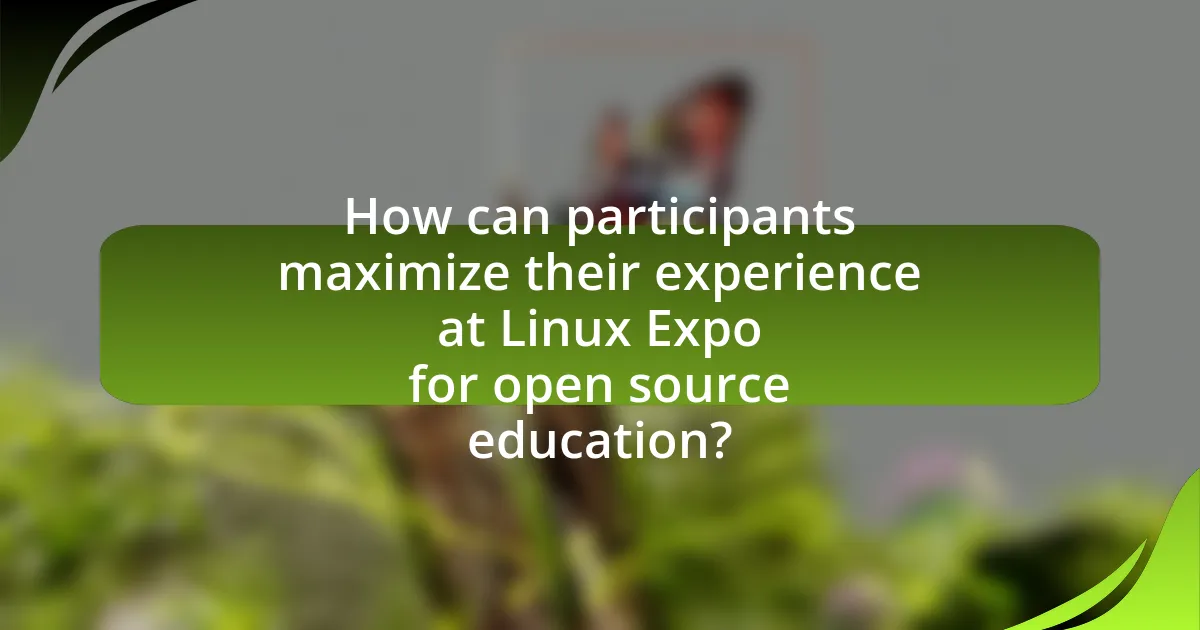
How can participants maximize their experience at Linux Expo for open source education?
Participants can maximize their experience at Linux Expo for open source education by actively engaging in workshops, attending keynote speeches, and networking with industry professionals. Engaging in hands-on workshops allows participants to gain practical skills and insights directly applicable to open source projects. Attending keynote speeches provides exposure to the latest trends and innovations in open source technology, enhancing their understanding of the field. Networking with industry professionals facilitates valuable connections that can lead to collaboration opportunities and mentorship, further enriching the educational experience. These strategies are supported by the fact that interactive learning environments significantly improve knowledge retention and application, as evidenced by studies showing that active participation enhances learning outcomes in educational settings.
What strategies can attendees use to engage effectively at Linux Expo?
Attendees can engage effectively at Linux Expo by actively participating in workshops, networking with industry professionals, and attending keynote sessions. Engaging in hands-on workshops allows attendees to gain practical skills and insights directly related to open source technologies. Networking with professionals provides opportunities for collaboration and mentorship, which can enhance learning and career prospects. Attending keynote sessions offers exposure to the latest trends and innovations in the open source community, fostering a deeper understanding of the subject matter. These strategies are supported by the interactive nature of the event, which encourages knowledge sharing and community building among participants.
How can participants identify valuable sessions and workshops?
Participants can identify valuable sessions and workshops by reviewing the agenda for topics that align with their interests and professional goals. They should prioritize sessions led by recognized experts in the field, as these presenters often provide high-quality insights and practical knowledge. Additionally, participants can look for workshops that include hands-on activities or real-world applications, which enhance learning and retention. Feedback from previous attendees can also serve as a reliable indicator of a session’s value, as positive reviews often highlight effective content and engaging delivery.
What are the best practices for networking during the event?
The best practices for networking during the event include actively engaging with attendees, utilizing social media for connections, and following up after the event. Engaging with attendees can be achieved by initiating conversations, asking questions, and showing genuine interest in their work, which fosters meaningful connections. Utilizing social media platforms, such as LinkedIn and Twitter, allows participants to connect with others before, during, and after the event, enhancing visibility and interaction. Following up after the event is crucial; sending personalized messages or emails to new contacts reinforces relationships and opens doors for future collaboration. These practices are supported by research indicating that effective networking can lead to increased opportunities and professional growth in the tech industry.
What follow-up actions should participants take after Linux Expo?
Participants should engage in networking by reaching out to contacts made during Linux Expo. This action fosters collaboration and knowledge sharing, which are essential for advancing open source education. Following the event, participants can also review and implement insights gained from workshops and presentations, enhancing their understanding of open source technologies. Additionally, sharing experiences and learnings on social media or community forums can contribute to the broader open source community, promoting ongoing dialogue and education.
How can attendees implement what they learned in their own educational contexts?
Attendees can implement what they learned by integrating open-source tools and methodologies into their educational practices. For instance, they can adopt Linux-based software for classroom management, utilize collaborative platforms like GitHub for project-based learning, and encourage students to contribute to open-source projects, fostering a hands-on understanding of software development. Research shows that using open-source resources enhances student engagement and promotes critical thinking skills, as evidenced by studies conducted by the Open Source Initiative, which highlight improved learning outcomes in environments that embrace open-source education.
What resources are available post-expo for continued learning in open source education?
Post-expo, resources for continued learning in open source education include online platforms, community forums, and educational materials. Websites like GitHub and GitLab provide repositories for collaborative projects, while platforms such as Coursera and edX offer courses on open source software development. Additionally, community forums like Stack Overflow and Reddit facilitate discussions and knowledge sharing among learners. Open source organizations, such as the Open Source Initiative, also provide documentation and guides that support ongoing education in this field. These resources collectively enhance understanding and engagement in open source education.
